Current news – FB 08 – Kernphysik (eng)
 We congratulate Dr. Viacheslav Tsaran on completing his dissertation entitled
We congratulate Dr. Viacheslav Tsaran on completing his dissertation entitled
Unified approach to nuclear pion scattering and photoproduction
A promising way to study how protons and neutrons are arranged inside atomic nuclei is by creating neutral pions through photon interactions with the nuclei. However, accurately modeling these interactions has been challenging. This research develops a new theoretical framework for pion production that accounts for the complex interactions between pions and nuclei.
Superconducting core component for international P2 experiment installed in underground hall at a depth of ten meters
25 November 2024
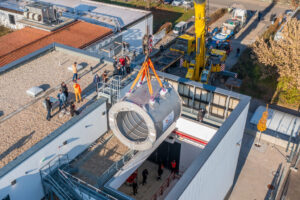
One of the flagship projects of the PRISMA+ Cluster of Excellence at Johannes Gutenberg University Mainz (JGU) is the construction of the new energy-recovering particle accelerator MESA (Mainz Energy-recovering Superconducting Accelerator), which will enable experiments with unprecedented precision in the future. One of the main experiments at MESA, P2, will play a key role in researching the "new physics" – physics beyond the Standard Model of particle physics – by measuring the so-called weak mixing angle. The central component of the P2 experiment, a superconducting magnet coil with a diameter of four meters and a weight of 21 tons, has now been delivered to the JGU campus and installed in the MESA particle accelerator. The magnet was manufactured in Vannes, France, and delivered to Mainz last Thursday. "We have been working together with the company SigmaPhi for almost five years to overcome the challenges and implement the state-of-the-art design for our experiment," said Professor Frank Maas, spokesperson of the P2 experiment, which is currently being set up by a collaboration of physicists from Germany, France, Canada, and the USA.
"Such a solenoid magnet is being used for experiments of this kind for the first time. Its large diameter makes it possible to record particularly high particle rates. However, the size of the magnet also posed a particular challenge in terms of design and production."
 We congratulate Marius Köppel on the completed dissertation entitled
We congratulate Marius Köppel on the completed dissertation entitled
"Data Flow in the Mu3e Data Acquisition System"
Marius Köppel has defended his PhD on the data acquisition system for the Mu3e experiment at PSI. Mu3e searches for the lepton-flavour-violating decay of a positive muon to two positrons and an electron. Marius has developed firmware for the data flow out of the detector to the filter farm and was instrumental to get the data acquisition and online analysis for the Mu3e integration and cosmic runs up and running. He has also contributed decisively to establishing the Mu3e MuPix pixel sensors as a tool for muon spin relaxation (MuSR) experiments. The thesis is available here.
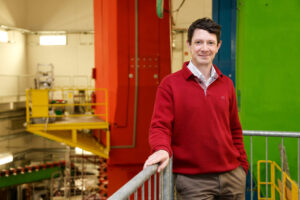 Major award for theoretical physicist of Mainz University and member of the PRISMA+ Cluster of Excellence
Major award for theoretical physicist of Mainz University and member of the PRISMA+ Cluster of Excellence
8 October 2024
Pierre Capel, Professor of Theoretical Physics at the Institute for Nuclear Physics of Johannes Gutenberg University Mainz (JGU) and member of the PRISMA+ Cluster of Excellence, has been elected a Fellow of the American Physical Society (APS). This honor recognizes his careful and creative application of few-body methods to the study of nuclear reactions involving exotic nuclei. The APS Fellowship Program was established to recognize outstanding members who have made significant advances in physics through original research and publication. It is a distinct honor that signifies recognition by professional peers. Each year, no more than 0.5 percent of APS members are elected to the Fellow status.
Collaborative Research Centre at JGU's Institute for Nuclear Physics seeks new physical phenomena through a better understanding of strong interaction processes
31 May 2024
The German Research Foundation (DFG) today approved the establishment of a new Collaborative Research Centre (CRC) at Johannes Gutenberg University Mainz (JGU). The CRC 1660 "Hadrons and Nuclei as Discovery Tools" aims to understand the strong interaction that leads to processes involving hadrons, nuclei, and atoms. The goal is to answer fundamental questions: What physical phenomena occur beyond the Standard Model of particle physics (SM) and how can we measure and describe them? The spokespersons of the new Collaborative Research Centre are Professor Concettina Sfienti (experiment) and Professor Marc Vanderhaeghen (theory) from the Institute for Nuclear Physics at JGU.
24.05.24
 From 13th to 17th may the workshop for Strange hadrons as precision tool for strongly interacting systems (SPICE) took place in Trento. “With 52 international participants and 39 keynote speakers, the conference offered a perfect platform to assess the present status of the field, to identify potential synergies within the community and to define experimental objectives for new cutting-edge research activities” Prof. Josef Pochodzalla, one of the organizers, resumes. To cover the field as broadly as possible a variety of topics were addressed during the five days workshop, including hypernuclei, exotic atoms, femtoscopy, extreme neutron rich nuclei, the kaon-nucleus interaction and the
From 13th to 17th may the workshop for Strange hadrons as precision tool for strongly interacting systems (SPICE) took place in Trento. “With 52 international participants and 39 keynote speakers, the conference offered a perfect platform to assess the present status of the field, to identify potential synergies within the community and to define experimental objectives for new cutting-edge research activities” Prof. Josef Pochodzalla, one of the organizers, resumes. To cover the field as broadly as possible a variety of topics were addressed during the five days workshop, including hypernuclei, exotic atoms, femtoscopy, extreme neutron rich nuclei, the kaon-nucleus interaction and the  strangeness in neutron stars.
strangeness in neutron stars.
The workshop was supported by the EU Strong 2020 project and ECT*.
Francesca Bonaiti is receiving the 2024 DAAD prize for international students
 Francesca Bonaiti from the group of Sonia Bacca stands out as one of the top physics PhD students at JGU. Consistently achieving exceptional results in her theoretical research, she has published several papers in peer-reviewed journals. Recognized for her strong potential, she also has collected several invitations to international conferences and has recently secured the prestigious 5-year FRIB theory fellow position in the USA.
Francesca Bonaiti from the group of Sonia Bacca stands out as one of the top physics PhD students at JGU. Consistently achieving exceptional results in her theoretical research, she has published several papers in peer-reviewed journals. Recognized for her strong potential, she also has collected several invitations to international conferences and has recently secured the prestigious 5-year FRIB theory fellow position in the USA.
Francesca Bonaiti's research lies in the field of theoretical nuclear physics. Employing complex computational tools, she studies the behaviour of atomic nuclei immersed in electric and magnetic fields, starting from the strong force binding protons and neutrons together in the nucleus. Her work, deepening our knowledge of nuclear structure, helps in advancing our understanding of the nature of neutron stars.
New physics in parity violation: From the Thomson limit to the energy frontier / Funding worth EUR 3.2 million
11 April 2024
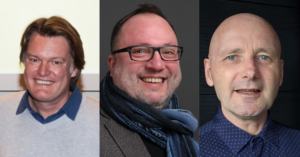
The consortium of Professor Maarten Boonekamp from Université Paris-Saclay as spokesperson and Professor Jens Erler and Professor Frank Maas of Johannes Gutenberg University Mainz has been awarded an ERC Advanced Grant for their project Zeptometry. This project aims to combine new precision measurements at the highest LHC energies at the European Organization for Nuclear Research CERN with challenging new precision measurements at very low energies with the upcoming MESA accelerator in Mainz in connection with the theory interpretation of the experimental results. The funding will be dedicated to the study of interactions between the Z boson and the fermions, i.e., the quarks and leptons constituting ordinary matter, to which end the upcoming experiment P2 at the Mainz electron accelerator MESA will be crucial.
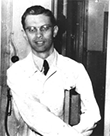
The founding director of our Institute turns 100 today
28 Feb 2024
Herwig Schopper, a pioneer in experimental particle physics in Germany and Europe and the founding director of the Institute of Nuclear Physics at the Johannes Gutenberg University Mainz celebrates his 100th birthday today.
27.10.2023
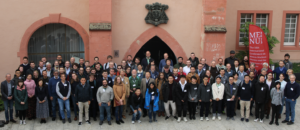
The "International Conference on Meson-Nucleon Physics and the Structure of the Nucleon (MENU 2023)" took place in the historic building of the Erbacher Hof in the old town of Mainz from October 16 to 20, 2023. More than 140 participants from 15 countries discussed their research results on topics in the field of hadron physics and related areas in 26 plenary and 77 parallel lectures sessions. Future developments in this field of research, such as the Electron-Ion-Collider in the USA and the Mainz Energy Recovering Accelerator MESA in Mainz, as well as new forward-looking developments in theory, also played a major role.

 Major award for theoretical physicist of Mainz University and member of the PRISMA+ Cluster of Excellence
Major award for theoretical physicist of Mainz University and member of the PRISMA+ Cluster of Excellence